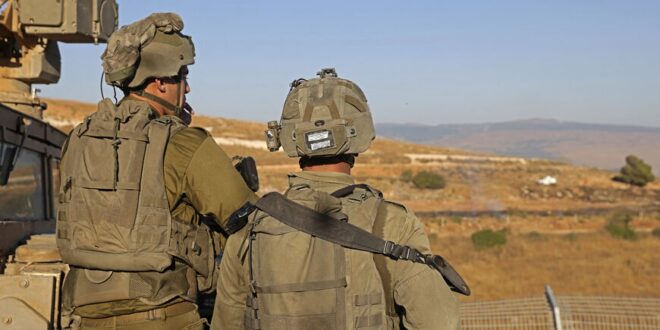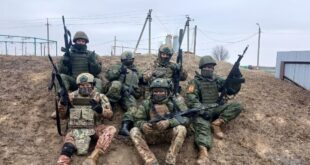IDF seniors warn that Hezbollah is becoming bolder and bolder, increasingly attempting to infiltrate Israeli territories and to provoke incidents with Israel.
Israeli security officials are concerned over increased boldness on the part of Hezbollah in recent weeks, with several attempts by its members to infiltrate into Israeli territories. In reaction, the Israel Defense Forces are also enhancing its visibility in the region.
The 7th Brigade of the Armored Corps, equipped with Israel’s most advanced Merkava tanks, held a large showcase drill in northern Israel this week. In an unusual move, a US-armored battalion joined the exercise and its commander was even interviewed on an Israeli TV channel. The exercise in the Wadi Ara region simulated an attack on the southern Lebanese town of Bint Jbeil, the scene of a bitter battle between Israeli troops and Hezbollah during the 2006 Second Lebanon War.
While Israel does not plan to invade Lebanon with the help of US forces in any future war with Hezbollah, the joint exercise was a clear attempt to restore Israel’s increasingly eroding deterrence vis-a-vis the Iran-backed militia, as reflected in growing tensions between the sides in recent months. The drill was a message to the organization’s Secretary-General Hassan Nasrallah that the domestic upheavals in Israel, including mass pro-democracy protests and threats of insubordination by reserve soldiers and pilots on active duty, have not undermined the military’s state of fitness and readiness.
“Nasrallah lost his fear”
Over the past three months, Hezbollah has repeatedly challenged the delicate rules of the game along the Blue Line, Lebanon’s internationally recognized border with Israel, for the first time since the understandings that ended the 2006 war. The latest incident was recorded last Wednesday, when Hezbollah fighters climbed on the security fence and took down an Israeli control camera.
“Nasrallah seems to have lost his fear,” a senior security source told Al-Monitor on condition of anonymity. “He is doing things he has not done since the Second Lebanon War, he is toying with a powder keg.” Asked whether Nasrallah was seeking a military confrontation with Israel, the official replied, “No, intelligence still believes that Nasrallah has no desire to enter a war with Israel, but he also no longer has deep-seated concern about a possible escalation into a day or a few days of limited fighting. It might even be good for him.”
But what starts out as a scenario of limited fighting can easily turn into an all-out war, as was the case 17 years ago, on July 12, 2006, when Hezbollah fighters infiltrated Israel, attacked a military patrol, killed two soldiers and kidnapped their bodies. Since that war, and Israel’s deadly retaliatory airstrikes on Hezbollah strongholds in Beirut, Nasrallah has shut himself in a Beirut bunker. He admitted at the time, in his own voice, that had he realized the intensity of the Israeli response, he would not have sent his men into Israeli territory. Seventeen years on, Nasrallah seems to be breaking out of his enforced isolation.
On April 6, Palestinian militias in Lebanon fired 34 rockets into Israel in the most serious cross-border incident since 2006. The barrage did not cause injuries or significant damage, but has been followed since by a series of minor provocations by Hezbollah and Lebanese civilians along the border. Reflecting Hezbollah’s growing daring, Iran’s Foreign Minister Hossein Amir-Abdollahian toured the border area in late April to observe, and the organization held a showcase exercise in May simulating an invasion of Israel. The latest incidents have also included the firing of an anti-tank missile into the disputed border village of Ghajar.
This drizzle of clashes might never have made headlines had it not been for a more serious incursion by eight or 10 heavily armed Hezbollah militants into the border region of Har Dov, territory claimed by both Israel and Hezbollah. The group set up two tents in plain sight, presenting Israel with a dilemma of how to react. To avoid escalation, the military did not initially report the incursion but was ultimately forced to concede that Hezbollah had in fact set up an outpost on its territory in early June.
Border skirmishes
After weeks of quiet negotiations mediated by the United Nations peacekeeping force along the border as well as the United States, Hezbollah folded up one of the tents but left the other, along with armed militants. The tents were initially thought intended to protest Israel’s contested claim to the territory, but according to the organization, the makeshift presence was intended to protest Israel’s erection of a fence around Ghajar that blatantly violated Lebanon’s sovereignty.
Hezbollah is right. Ghajar is split between Lebanese and Israeli territory. For years, the Israeli military prevented Israeli civilians from entering the village because it was completely open on the Lebanese side and thus posed a risk to Israelis. In order to ease the restrictions on the local village residents and enable access by Israeli visitors, Israel recently erected a perimeter fence around the village. Hezbollah is demanding its removal in exchange for clearing out the remaining tent.
One can only imagine the fury of [current Prime Minister Benjamin] Netanyahu, had the previous government led by Naftali Bennett and Yair Lapid allowed such a blatant breach of Israeli sovereignty by Hezbollah. Netanyahu lashed out last year at the agreemen Lapid reached with Lebanon delineating the two countries’ maritime border to allow gas drilling by both countries and accused him of selling out Israeli interests. Now, he is containing the event and leaving its resolution to UN mediation.
American mediator Amos Hochstein arrived in Israel this week to weigh in on the negotiations with Hezbollah and Lebanon, but Hezbollah fighters are still ensconced in territory claimed by Israel and Nasrallah, speaking on Thursday, solemnly announced, “If Israel hits the tent, we will not sit quietly by.”
Hezbollah presumably monitored the construction of the fence since it began more than a year ago, but waited until now to make its move. “Nasrallah has probably identified Israeli weakness,” a former senior Israeli military source told Al-Monitor on condition of anonymity. “He sees the demonstrations, the protests by reserve soldiers, the resentment among the reserve pilots and the widening internal rift in Israel, and identifies an opportunity. Nasrallah is not a man who misses such opportunities.”
Netanyahu’s government is trying to signal Nasrallah that he is wrong. This week, Channel 13 News aired recordings of Netanyahu ranting for long minutes over the growing incidents of insubordination among air force reservists. Netanyahu, a man who rarely shouts or bangs on the table, had clearly lost his cool, realizing the potential repercussions of such perceived Israeli weakness in terms of Hezbollah’s daring.
Israel’s latest intelligence assessment does not see Nasrallah interested in an all-out confrontation with the Israeli army, clearly aware of the differences in the balance of power between the sides. But he is no longer afraid of a few days of fighting and has clearly raised the level of provocations against the Israeli military.
“The border between Israel and Lebanon was relatively quiet for many years,” the security source told Al-Monitor. “It is suddenly now a source of friction, which could deteriorate at any given moment. That is a fact. The question is whether the sides will be wise enough to stop themselves before the red line is crossed.”
In the meantime, the only line that has been crossed is the Blue Line. Nasrallah is engaging Israel in complex and dangerous maneuvers because he believes that the domestic situation curbs Netanyahu’s ability to act against him. Nasrallah must take into account another possibility — that Netanyahu might be tempted to embark on a limited course of fighting with Hezbollah in order to divert public attention and pressures by proponents and opponents of the hugely controversial judicial overhaul he is leading. Such considerations could spell major trouble ahead.
 Eurasia Press & News
Eurasia Press & News



